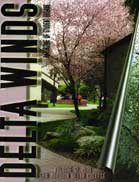I Can See the Rainbow
 Delta Winds: A Magazine of Student Essays
Delta Winds: A Magazine of Student Essays
A Publication of San Joaquin Delta College
1999
I Can See the Rainbow
Peter Daher
Do you remember the show called The Twilight Zone? Today, I stepped outside at nine in the morning. It was very dark and dreary. The very fast wind rushed upon my face. I looked up at the half black and dark gray sky. I then realized I was in The Twilight Zone. I could see that man . . . standing, smoking a cigarette. Do you remember the song they played in the beginning of the show? Can you hear it? Can you feel it? This is how I felt when I looked outside today. When I was outside, I thought of the future of Internet technology and who will be left behind. The Internet will probably leave low-income individuals, uneducated citizens, and the natural world in the dust of The Twilight Zone . . . along with myself.
In the fast-paced Internet community, most low-income individuals will be left behind. Most of them do not have a choice in the matter. Most do not make enough money to buy a computer. Low-income people, minimum-wage earners, are overworked and underpaid. Even if they had a computer, they probably could not afford the online service. Low-income individuals hardly use computers at all. They work as janitors, farmers, housekeepers, factory workers, laborers, kitchen workers and rarely require computers. Most will never be able to be part of the Internet. It's ironic that these excluded individuals would probably love the chance to be online. Virtual communities are generally less critical of people so often outcast by society. They would enjoy searching the Internet for somewhere to belong, like in the essay "Is There a There in Cyberspace?"
Most of our older generation and some Baby Boomers will also not be part of the Internet technology future. Many admit they may not be smart enough to understand computers. They are afraid of the "computer" and what it can do. My friend Lisa's father had a great job working for a major city newspaper. He did front page paste-up. When they told him that he could no longer do his job by cutting and pasting by hand, he felt lost and scared. When he was told that he needed to learn how to use the computer, he replied, "I will retire now!" This Baby Boomer is a perfect example of how most Americans feel.
My ninety-two-year-old sage woman friend asked me once, "What is all that 'www' stuff on the TV?" She is a very intelligent person, and sharp as a tack, but she says she wants nothing to do with computers. This senior citizen is a retired psychiatric nurse. Back in her day, she was very educated, but computers were not yet used extensively. They were not needed at work or at home. When many older Americans started using computers, some jobs were actually easier, but thousands and thousands of jobs were eliminated.
The Internet will steal most of America's time. There will be no time left for the natural world. First, Americans will ignore their house plants. Then most of the yards will be forgotten and never watered again. Computer rooms will be added onto homes, taking up what used to be their beautiful gardens. They will visit gardens of their dreams on the computer hosted by Martha Stewart. Next, Americans will forget about their house pets and farm animals. We will have virtual pets instead of real pets. We already walk around with "giga" (computer) pets. Plants do not have the brains to survive the Internet future. Animals will become scarce and eventually become extinct or wild. People will be spending most of their time on the computer so the natural world will slowly deteriorate. Suddenly people will notice that the sky has become black and gray--just like in The Twilight Zone. And then all communities and towns around the world will look the same . . . like the author said in the Air Ship.
In The Twilight Zone world where computers threaten to rule everyone's lives, some are left out and some feel that way. Low-income people, senior citizens, and I are all hoping to find the yellow brick road--a road which is not scary, dark, or dreary but for some just might be Internet free. Life has a lot of roads . . . and one eventually always leads home. I can see the rainbow.






